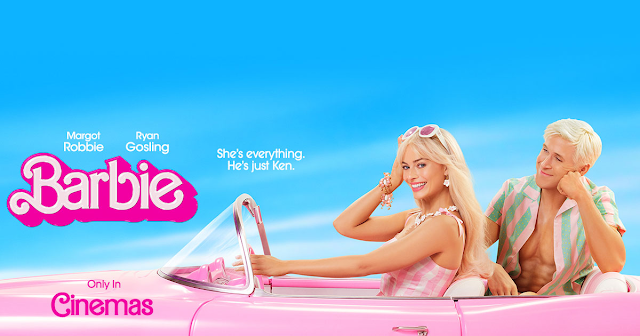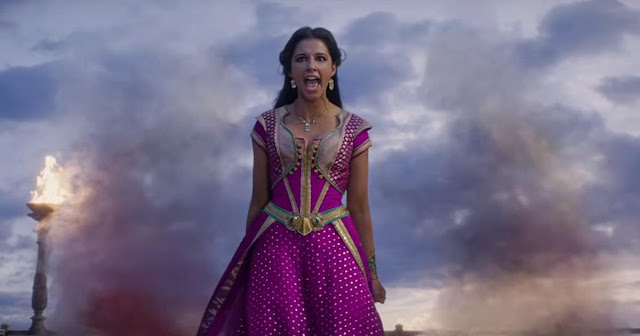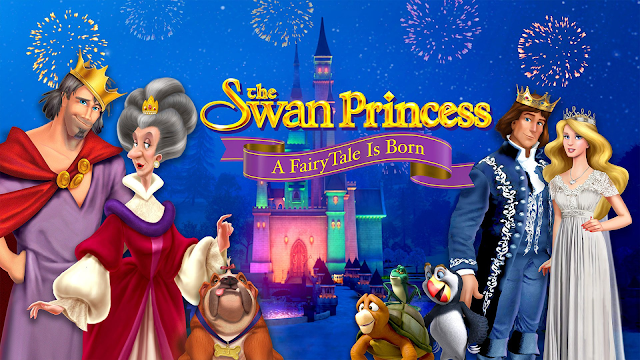Review: Barbie (2023)
While princesses return to their storybook roots and Hollywood goes on strike, one highly anticipated movie that encapsulates the face of pop culture today is hitting theaters: Barbie. One of the many things that sets this live-action adaptation of a previously animated property and toy line apart from Disney's endless onslaught of live-action remakes is that this film is an original story that only uses the familiarity of its brand as a selling point. It isn't entirely original since similar concepts were used in Disney's 2007 Enchanted and the 2000 made-for-TV movie, Life-Size that Tyra Banks as a living doll, but this is the first time that Barbie has ever been portrayed in the real world. Her many animated films and series, which are directed toward younger audiences, feature her living in a fantasy version of Malibu with her sisters or reenacting classic fairy tales, ballets, and other popular stories. This movie depicts Barbie learning about the hardships and complexities of being a real person. It provides an extensive commentary about feminism and what it means to be a woman in today's society, while also being ridiculously over the top. In fact, it's so many different things at the same time that it's difficult to form only one opinion about it.
Barbie lives in a perfect pink utopia where women rule the world, and everything is made out of plastic. Every day is the best day ever until one day, it isn't. She begins having thoughts about death, her high-heeled feet go flat, and her flawlessly perfect appearance becomes flawed. The other Barbies send her to see Weird Barbie, a guru of sorts, to learn how to fix these issues so everything can go back to the way it was before. Weird Barbie reveals that Barbie has opened a portal to the real world and must go on a journey to find her owner and fix the problem from their end. She is surprised to learn that the girl she is looking for, Sasha, is a goth social justice warrior who hates Barbie and everything she stands for. Just when Barbie gives up any hope of resolving Sasha's issues and is about to surrender herself back to Mattel, Sasha's mother, Gloria, who also works for Mattel, realizes that she is the one who opened the portal to the real world by projecting her own issues of anxiety and self-doubt onto Barbie.
While having the Kens turn Barbie Land into a patriarchy is obviously an over-the-top satire, it is unclear whether the satire is meant to portray an exaggerated version of the real world, implying that women still have no power in modern society despite how far they've come over the past century, or if it is making fun of how modern feminists view the patriarchy. In the end, the audience will leave the movie with an unclear interpretation of how it views men and probably read into it in whatever way matches most closely to their own personal biases. By not giving Barbie a love interest in the real world like her counterparts in Enchanted and Life-Size and making her completely indifferent to her built-in love interest who was literally made for her, the film perpetuates the modern stereotype that wanting to have a life partner to help with the issues that the movie repeatedly acknowledges modern women face is bad. I think the show Crazy Ex-Girlfriend did a better job of acknowledging that it's okay to want a relationship as long as you work on your own underlying issues first. At least Barbie apologizes to Ken at the end.
Barbie lives in a perfect pink utopia where women rule the world, and everything is made out of plastic. Every day is the best day ever until one day, it isn't. She begins having thoughts about death, her high-heeled feet go flat, and her flawlessly perfect appearance becomes flawed. The other Barbies send her to see Weird Barbie, a guru of sorts, to learn how to fix these issues so everything can go back to the way it was before. Weird Barbie reveals that Barbie has opened a portal to the real world and must go on a journey to find her owner and fix the problem from their end. She is surprised to learn that the girl she is looking for, Sasha, is a goth social justice warrior who hates Barbie and everything she stands for. Just when Barbie gives up any hope of resolving Sasha's issues and is about to surrender herself back to Mattel, Sasha's mother, Gloria, who also works for Mattel, realizes that she is the one who opened the portal to the real world by projecting her own issues of anxiety and self-doubt onto Barbie.
That storyline alone could have made for a poignant and interesting commentary about the complexities of womanhood, but the plot gets clouded by spending an even bigger amount of time on its secondary and more controversial storyline revolving around Ken and the patriarchy. This is the portion of the movie that I did not enjoy nearly as much, and it takes a lot of much-needed screen time away from giving Barbie a chance to resolve the issues with Sasha and Gloria. Ken's struggles derive from the fact that Barbie treats him like the accessory that he was created as instead of a real boyfriend or even a companion. While the animated version of Barbie is nice to everyone, including Ken, this version of the bubbly blonde constantly gives him the cold shoulder, leaving him with feelings of worthlessness and endless longing for something more. When he enters the real world and learns that men can have power there and that women aren't in charge of everything, he decides to team up with the other Kens to take over Barbie Land.
Though it is clear that Ken has some false ideas about how the real world works, the movie has contradictory messages about how much power women have in modern society. On the one hand, it shows a female doctor telling Ken that he needs a medical degree to perform surgery and that simply being a man is not enough to qualify him, but on the other hand, it makes a point of the fact that there are no female executives working at Mattel. After seeing the movie, I looked up Mattel's board of directors and found that only some vice presidents and the executive producer of the animated Barbie movie franchise are female, but that is still more than this film made it look like. There have also been many other women in important positions at the company in the past, particularly Ruth Handler, the creator of Barbie, to whom the movie pays tribute in a big way.
While having the Kens turn Barbie Land into a patriarchy is obviously an over-the-top satire, it is unclear whether the satire is meant to portray an exaggerated version of the real world, implying that women still have no power in modern society despite how far they've come over the past century, or if it is making fun of how modern feminists view the patriarchy. In the end, the audience will leave the movie with an unclear interpretation of how it views men and probably read into it in whatever way matches most closely to their own personal biases. By not giving Barbie a love interest in the real world like her counterparts in Enchanted and Life-Size and making her completely indifferent to her built-in love interest who was literally made for her, the film perpetuates the modern stereotype that wanting to have a life partner to help with the issues that the movie repeatedly acknowledges modern women face is bad. I think the show Crazy Ex-Girlfriend did a better job of acknowledging that it's okay to want a relationship as long as you work on your own underlying issues first. At least Barbie apologizes to Ken at the end.
There isn't a single thing that this movie does halfway, and that includes the costumes and sets, which are by far its biggest strength. Barbie Land is a beautiful pink paradise with almost no CGI. Rumor has it that the movie used so much pink paint on the set that it caused an international shortage. Though this is not a remake of any of the animated Barbie properties, the aesthetics are closest to Life in the Dreamhouse, a self-aware series of animated shorts that ran from 2012 to 2015 and showed Barbie and her friends living in an obviously plastic world that used flat decals to represent food, electronics, and other items that would not be functional in the real world. The movie also focused on vintage Barbie dolls and fashions, particularly those that were lesser-known or discontinued, including the pregnant Midge doll, Ken's friend, Allan, and Growing Up Skipper, a doll that gets taller and grows breasts when you pull her arm. There was a particularly funny scene in which Ken started throwing Barbie's clothes out the window with each fashion item freeze-framing in midair and its title appearing on screen. There was also an original jingle at the beginning of the movie that sounded like a commercial until the lyrics started changing when Gloria's negative thoughts leaked into Barbie's world. It's a fun movie to watch that's filled with bright colors and over-the-top visual gags.
Barbie's live-action adaptation brings together a blend of commentary, satire, and exaggerated storytelling that makes it difficult to form a singular opinion. Within its vibrant pink utopia, Barbie confronts mortality, physical imperfections, and the complexities of being a real person. As she embarks on a journey to find her owner, Sasha, and fix the issues that formed the portal to the real world, the film touches upon feminism and societal expectations, depicting a sharp contrast between Barbie Land and the real world. However, it also delves into a convoluted secondary plot centered around Ken and the patriarchy, muddying the intended focus of the story. The movie's visual appeal shines through its striking sets and costumes, paying homage to vintage Barbie dolls and fashion. While the film's themes and execution may leave viewers with an unclear interpretation of its stance on certain ideas, it remains an entertaining and visually stunning spectacle.













Comments
I'm not sure how to directly respond to comments, but this intrigues me. I would think that Barbie and Ken not getting together in this movie is because of Mattel's current mindset about Barbie and Ken as a couple. I know the Barbie Dreamhouse Adventures world isn't exactly popular with many older fans of the characters, but I think knowing some of the ins and outs of it could help show why it turned out like this. The BDA universe really pushes the idea of Barbie and Ken as friends with a sibling like bond. In fact, the show portrays them as such good friends that there's very few episodes that tease the idea of them as a couple. You could kind of see this in action with how Barbie: Princess Adventure basically makes Ken a butt monkey whenever he tries getting alone time with Barbie. Even as someone who loves that movie and thinks it's underrated, that part was not handled well. Then we get to the TV series Barbie: It Takes Two, which seems to be built on the stereotypes of what people think Barbie is (very few people from Barbie Dreamhouse Adventures moved over to that series, and has a different showrunner, Marsha Griffin instead Ann Austen, who never worked in this universe before despite her experience with Barbie). She's made less intelligent in that series, and whenever Ken gets a prominent role, he's just there to pine after Barbie and be made into a bigger butt monkey with his failures. Barbie: Epic Road Trip technically has them get together, but since it's an interactive movie, viewers specifically choose for it to happen, and the events of Netflix interactive movies and specials based on an established property don't get brought up in an future projects in that world. It seems like that feeling there is translated to all media.